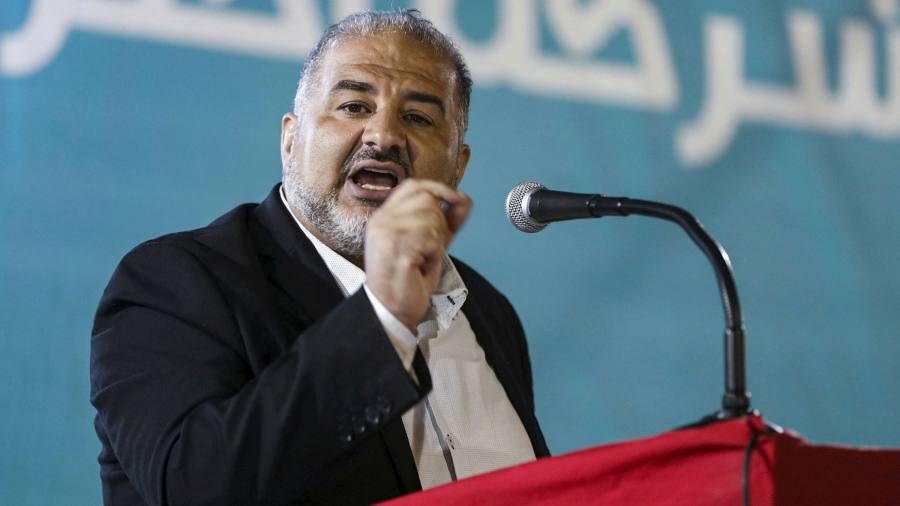[ad_1]
Two years ago, Mansour Abbas was a rookie politician, an Islamist dentist testing the waters of Israel’s combative parliament.
Three stalemated elections later he is a veteran of the political chaos that has engulfed the country, seeking to carve out an opportunity for his Arab party, Ra’am, to wield influence in the Knesset as traditional factions fall apart.
If his gambit pays off in the March election, the fourth in two years, it would mark a historic shift — an Islamist party that seeks protection for traditional Muslim lifestyles, having a say in the Jewish state’s future.
The back-to-back elections have reshaped Israel’s political landscape, unexpectedly creating a space for Abbas to have influence. The Blue and White party, a centre-right alliance that briefly equalled the popularity of the ruling Likud, has collapsed, the left has been obliterated and the rightwing has split, with hawkish rivals emerging to challenge Prime Minister Benjamin Netanyahu.
With all but Netanyahu in disarray, Abbas — whose party has a handful of seats in the 120-seat parliament — could become a kingmaker, or at least a powerful tiebreaker between those who want Netanyahu as premier and those who vow to send him to the opposition to face his corruption trial as a backbencher.
“We don’t want to stay in the margin of the margins,†Abbas, 46, said in an interview last month in his office in Israel’s Arab-dominated north. “This personal animus against Netanyahu, or for Netanyahu, is a zero-sum game — but if I engage simply on the question of policies, I can effect change.â€

Polls show support for Ra’am is likely to give the party around four parliamentary seats. The last three elections came down to a difference of a few seats between the pro-Netanyahu and anti-Netanyahu camps.
Israel’s Arab-focused parties, which have often run under a single umbrella known as the Joint List, have traditionally defined themselves as an eternal opposition. The Joint List, an uneasy alliance of Arab communists, nationalists and Islamists like Abbas, disintegrated after winning 15 seats in the March 2020 poll. Israeli Arabs make up a fifth of the country’s electorate but are less likely than Jewish voters to turn out at the polls.
Abbas and his allies have adopted a strategy pioneered by deeply religious ultraorthodox Jewish groups in the 1980s, who have for the past decade held considerable sway over Netanyahu by propping up his coalition and threatening to pull out if their demands are not met.
“He would like to position himself as an Arab party willing to co-operate with any government,†said Arik Rudnitzky, an expert on Arab-Israeli voting behaviour at the Israel Democracy Institute.
By agreeing to prop up a minority government from outside the coalition, Abbas could win benefits for conservative Arab voters, perhaps more money for police protection or a new hospital.

“I don’t really see this as so black and white — as coalition or opposition,†said Abbas. “To play an important role, we have to embrace the third way, somewhere between those two, not a traditional coalition, not a traditional opposition.â€
But the prime minister’s anti-Arab, race-baiting campaigns of the past make it unlikely that he could hold together a government that requires support from an Arab leader, especially an Islamist.
“A Likud-led government supported by Ra’am, it wouldn’t hold even for a week,†said health minister Yuli Edelstein, an ally of Netanyahu’s and a Likud heavyweight. “I just don’t think that’s possible. Israel has never had a minority government, even though that is a suggestion in the air right now.â€
Still, the disarray among Arab-Israeli voters has tempted Netanyahu, who has made a highly publicised overture to the electorate. Trailed by television cameras, Netanyahu has visited vaccination centres in Arab-populated cities and promised to set up a special committee to deal with high crime in Arab cities such as Nazareth and even appoint an Arab minister.
Some polls suggest Arab voters could provide as many as two seats for Likud; another showed that at least a quarter of Arab Israelis thought it worthwhile to co-operate with Netanyahu.
Abbas has embraced the prime minister’s political pragmatism as evidence he can be swayed by the needs of the Arab community. “The others want to bring an end to Netanyahu, while I am talking about changing his policies to what is good for my people,†he said. “In that regard, we are completely different. They want to change Netanyahu, and I want to change his policies about our people.â€
But he is also cautious. Netanyahu has survived 30 years in Israeli politics by betraying his allies. Abbas said that by being agnostic about Netanyahu’s future, which hinges on the outcome of not just this election but his ongoing corruption trial, he has protected his own back.
“If all I want to do is change Netanyahu’s politics, why would he stab me?†he said. “Not in the back, not in the neck and not in the chest.â€
[ad_2]
Source link





